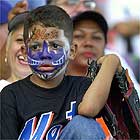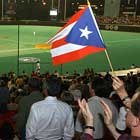|
 |
|
Esta página no está disponible en español. Islanders Cheer 'Los 'Spos’…Clemente Looms Large Over games
Islanders Turn Out To Cheer 'Los 'Spos' By Matthew Hay Brown | San Juan Bureau April 12, 2003
Team colors. (TONY GUTIERREZ/THE ASSOCIATED PRESS) ---------- SAN JUAN, Puerto Rico -- José Vidro was there for the home team and Roberto Alomar led the visitors. Vendors sold piña coladas and the crowd shimmied to the beat of plena music. The Montreal Expos may have brought Major League Baseball to Puerto Rico, but from the soccer-style crowd chants to the tricolor flags waving in the stands, Puerto Rico is bringing a Latin rhythm and style to the game. The troubled Canadian franchise, looking to raise cash while major-league owners settle on a buyer, landed at Hiram Bithorn Stadium on Friday to take on the New York Mets in the first of 22 home-away-from-home games this year. For some on the island, the visits scheduled for this month, June and September are more than a rare opportunity to see Sammy Sosa, Vladimir Guerrero and Alomar play in their native Caribbean. They are a chance to prove this baseball-crazed island, birthplace of Hall of Famers Roberto Clemente and Orlando Cepeda, can support a team of its own. "Look at the stadium -- it's full," said Frank Fernández, watching with his wife and their two children from the third-base side of the 20,000-seat ballpark. "When was the last time the Expos sold out in Montreal?" It may be wishful thinking. Puerto Rico would rank 12th in size among major-league markets, but it would also be the poorest. The seating capacity at Bithorn would have to be doubled, and travel would be expensive. A group has emerged with a proposal to buy the Expos and move them to San Juan, but buyers from Washington, D.C., northern Virginia and Portland, Ore., are thought to be more likely to land the team. As los 'Spos, as locals are calling the team, hit the field in San Juan for the first time Friday, fans were content to cheer on the Puerto Rican players Alomar, Vidro, Wilfredo Cordero and Rey Sánchez, and to dream about what could be. "This is a unique opportunity," said Saul Vargas, who was planning to see several of the games over the summer. "Puerto Rico has all these great ballplayers, and usually we see them only on television. This is great for the island." For the Puerto Rican players, too, the games are a rare chance to perform for friends and family.
Waving the flag. (TOMAS VAN HOUTRYVE/THE ASSOCIATED PRESS) ---------- "It's like a dream come true for me," Alomar, of Salinas and the Mets, said before the game. Since the games were announced last fall, the media here have covered the Expos as a local team, sending reporters to spring training and continuing through their opening road swing through Atlanta, New York and Chicago. After a weeklong countdown, the opener Friday knocked the war off the cover of the tabloid Primera Hora, which proclaimed Puerto Rico the "Isla de Grandes Ligas" -- Big League Island -- to lead page upon page of full-color coverage. Three hundred journalists, from Puerto Rico, the United States, Canada and Japan, sought credentials for the opening series. Wisely, organizers began the opening ceremonies early; with a Canadian team playing an American team on Puerto Rican soil, it took several minutes just to dispense with the anthems. When the pop balladeer Millie Corretjer sang "La Borinqueña" in a mournful a cappella, the crowd joined in, the majestic melody echoing through the stadium. The stadium announcer delivered the lineups in English and Spanish, adding the native countries of the Latin American players -- "de Cuba, Orlando 'El Duque' Hernández; el Mexicano, Luís Ayala; de Venezuela, Tony Armas Jr." -- to raucous applause for each. Cepeda, the island's only living Hall of Famer, threw the ceremonial first pitch to Cordero, and at 7:17 p.m. Atlantic Standard Time came the call: "Plei Bol!" The Expos wore the bleu, blanc et rouge of Montreal, but with patches showing the rojo, azul y blanco of the Puerto Rican flag. It didn't take long for the team to ingratiate themselves with their new fans, pounding out seven runs in the bottom of the third inning to break the game open. The crowd cheered when Vidro doubled, booed when Mets pitcher David Cone intentionally walked the Dominican slugger Guerrero, and roared when Brian Wilkerson knocked in Cordero, Vidro and Guerrero with a drive into the right-field bleachers for a grand slam. Vidro followed with a two-run blast of his own in the 8th inning. The Expos won the inaugural game 10-0. It was not clear whether the Expos would return again for more games next year. Major League Baseball, which operates the team on the behalf of the owners of the other 29 franchises, wants to choose a buyer by the All-Star break in July, but the team may play its 2004 home games in Montreal. Atlanta businessman Charles Vaughan Velazquez has said he has a plan and investors to buy a major-league team and move it to San Juan permanently. "I believe this has been a realistic possibility for many, many years now," he said. "It's an economically viable opportunity, and that will be evidenced by the 22 games."
Clemente Looms Large In Puerto Rico April 12, 2003 SAN JUAN, Puerto Rico (AP) -- Even as the Montreal Expos make San Juan their part-time home, the biggest name in Puerto Rican baseball is a player who died 31 years ago: Roberto Clemente. New York Mets second baseman Roberto Alomar and Expos general manager Omar Minaya headed a baseball delegation Saturday that went to the Roberto Clemente Sports City in nearby Carolina. On a covered tennis court, they spoke to about 400 children and their families, telling them about baseball and education. ``I told them to stay in school, stay away from drugs and alcohol,'' said Alomar, born in Ponce. ``Don't let anybody tell you you can't do this, you can't do that. It's always up to you. If you have a God-given talent, you can do it.'' Clemente died in a plane crash making a relief mission on New Year's Eve 1972, and the Hall of Famer is regarded with reverence. The sports complex named after him has seven fields, 10 batting cages, a swimming pool, a track, and facilities for other sports. Alomar, a 12-time All-Star, is the closest to Clemente among current players in the esteem he is held in Puerto Rico. He scored his 1,417th run Saturday night, passing Clemente for the most among Puerto Rican-born players. ``To pass Roberto Clemente in Puerto Rico, it was real special, to be in front of my people, in my country, with my family,'' Alomar said after the Mets' 5-4 loss. ``I think Roberto Clemente's always going to be at the top, even though I passed him. I always believe he's here with me -- he's an angel. It's a real special night and I know he's watching us.'' Also at the event were Vera Clemente, widow of the Pittsburgh Pirates outfielder, and their two sons. Among those who spoke were Lou Melendez, a vice president in the commissioner's office, and Tony Bernazard, the former major league infielder who is now a special assistant to union head Donald Fehr. ``I talked to the kids about Roberto Clemente, what Roberto Clemente meant for me, what Roberto Clemente meant for Puerto Rico and for baseball,'' said Bernazard, born in Caguas. ``A woman asked me about the opportunity to play baseball in college, what you have to do.'' While Puerto Rican prospects are subject to the amateur draft and can't be signed until the year their high-school class graduates, players in other Latin American countries are free agents and can be signed in the year they turn 16. Bernazard thinks the different treatment hurts baseball in Puerto Rico. ``Some people in the major leagues think you have to sign the players younger so you get them less expensive,'' Bernazard said before the Expos played the Mets on Saturday night. ``The Dominican Republic is going to pay a big price later because they have kids quitting school at age 12, 13. That's a shame. That's a crime. I've got four sons. Every parent wants their children to get an education.'' Minaya, who was born in the Dominican Republic and grew up in New York, was impressed by the activity at the complex. Even a gridiron football game was going on. ``To me, it was nice to know that Roberto's dream of a sports complex was being realized,'' he said.
|

 ----------
---------- ----------
----------